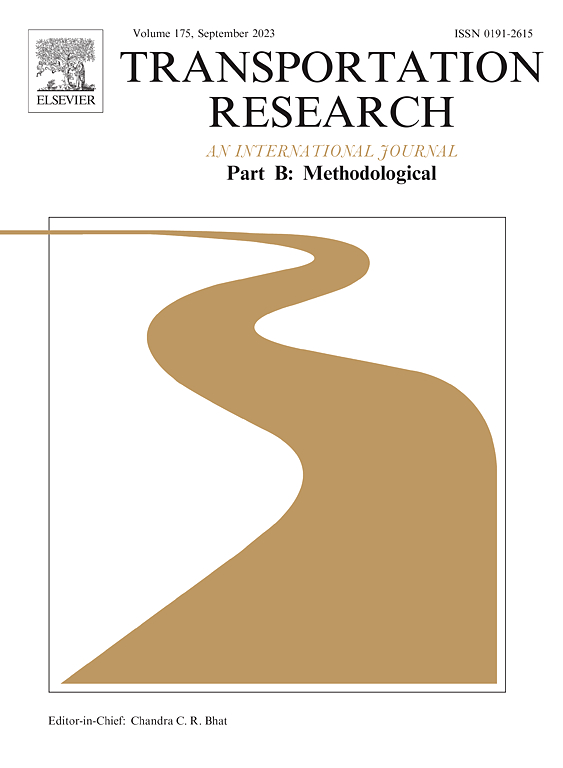Conditional forecasting of bus travel time and passenger occupancy with Bayesian Markov regime-switching vector autoregression
IF 5.8
1区 工程技术
Q1 ECONOMICS
引用次数: 0
Abstract
Accurate forecasting of bus travel time and passenger occupancy with uncertainty is essential for both travelers and transit agencies/operators. However, existing approaches to forecasting bus travel time and passenger occupancy mainly rely on deterministic models, providing only point estimates. In this paper, we develop a Bayesian Markov regime-switching vector autoregressive model to jointly forecast both bus travel time and passenger occupancy with uncertainty. The proposed approach naturally captures the intricate interactions among adjacent buses and adapts to the multimodality and skewness of real-world bus travel time and passenger occupancy observations. We develop an efficient Markov chain Monte Carlo (MCMC) sampling algorithm to approximate the resultant joint posterior distribution of the parameter vector. With this framework, the estimation of downstream bus travel time and passenger occupancy is transformed into a multivariate time series forecasting problem conditional on partially observed outcomes. Experimental validation using real-world data demonstrates the superiority of our proposed model in terms of both predictive means and uncertainty quantification compared to the Bayesian Gaussian mixture model.
基于贝叶斯马尔可夫状态切换向量自回归的公交出行时间和乘客入住率条件预测
准确预测不确定的公交出行时间和乘客入住率对旅客和公交机构/运营商都至关重要。然而,现有的公交出行时间和乘客入住率预测方法主要依赖于确定性模型,仅提供点估计。在本文中,我们建立了一个贝叶斯马尔可夫状态切换向量自回归模型来联合预测具有不确定性的公交出行时间和乘客入座情况。所提出的方法自然地捕捉了相邻公交车之间复杂的相互作用,并适应了现实世界公交车行驶时间和乘客入住率观察的多模态和偏态。我们开发了一种有效的马尔可夫链蒙特卡罗(MCMC)采样算法来近似得到的参数向量的联合后验分布。在此框架下,下游公交出行时间和乘客入住率的估计被转化为一个以部分观测结果为条件的多元时间序列预测问题。使用真实数据的实验验证表明,与贝叶斯高斯混合模型相比,我们提出的模型在预测均值和不确定性量化方面都具有优势。
本文章由计算机程序翻译,如有差异,请以英文原文为准。
求助全文
约1分钟内获得全文
求助全文
来源期刊
CiteScore
12.40
自引率
8.80%
发文量
143
审稿时长
14.1 weeks
期刊介绍:
Transportation Research: Part B publishes papers on all methodological aspects of the subject, particularly those that require mathematical analysis. The general theme of the journal is the development and solution of problems that are adequately motivated to deal with important aspects of the design and/or analysis of transportation systems. Areas covered include: traffic flow; design and analysis of transportation networks; control and scheduling; optimization; queuing theory; logistics; supply chains; development and application of statistical, econometric and mathematical models to address transportation problems; cost models; pricing and/or investment; traveler or shipper behavior; cost-benefit methodologies.

 求助内容:
求助内容: 应助结果提醒方式:
应助结果提醒方式:


